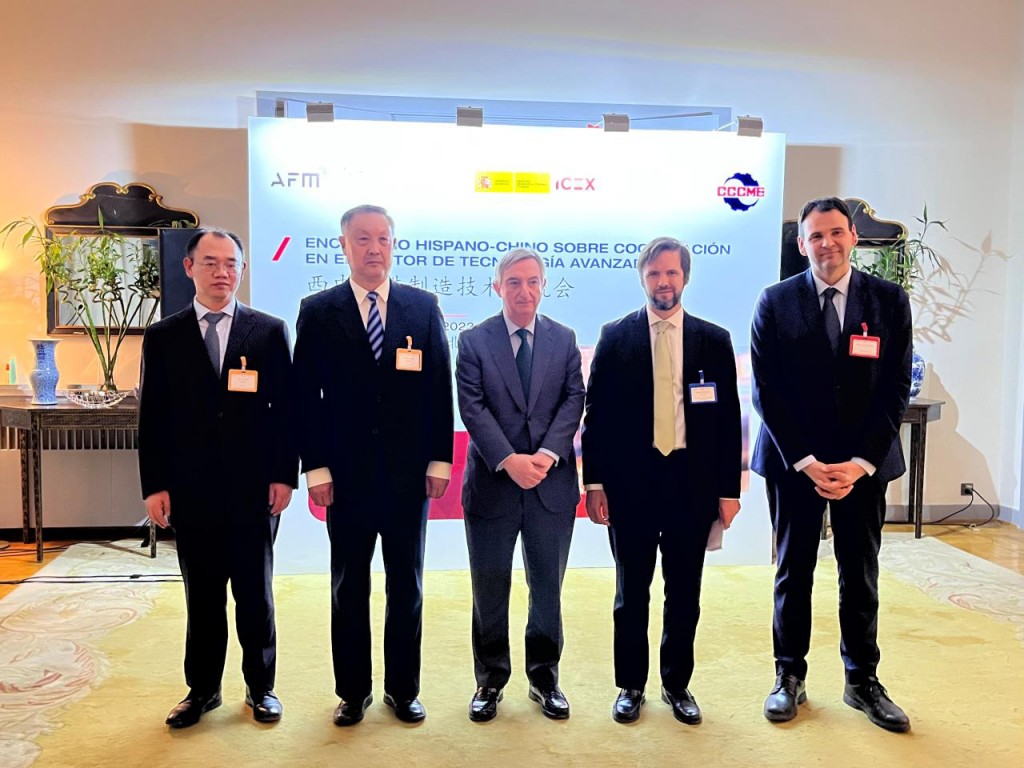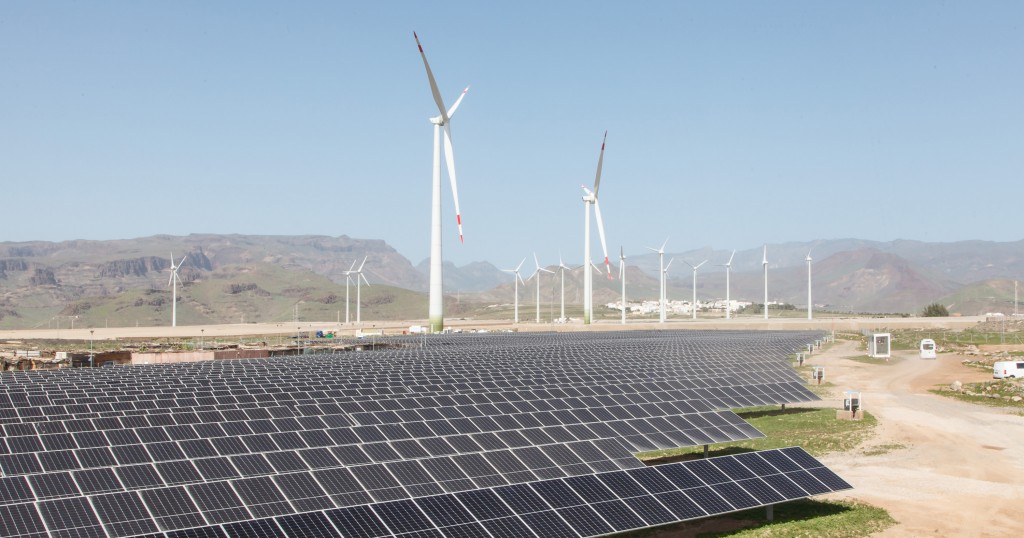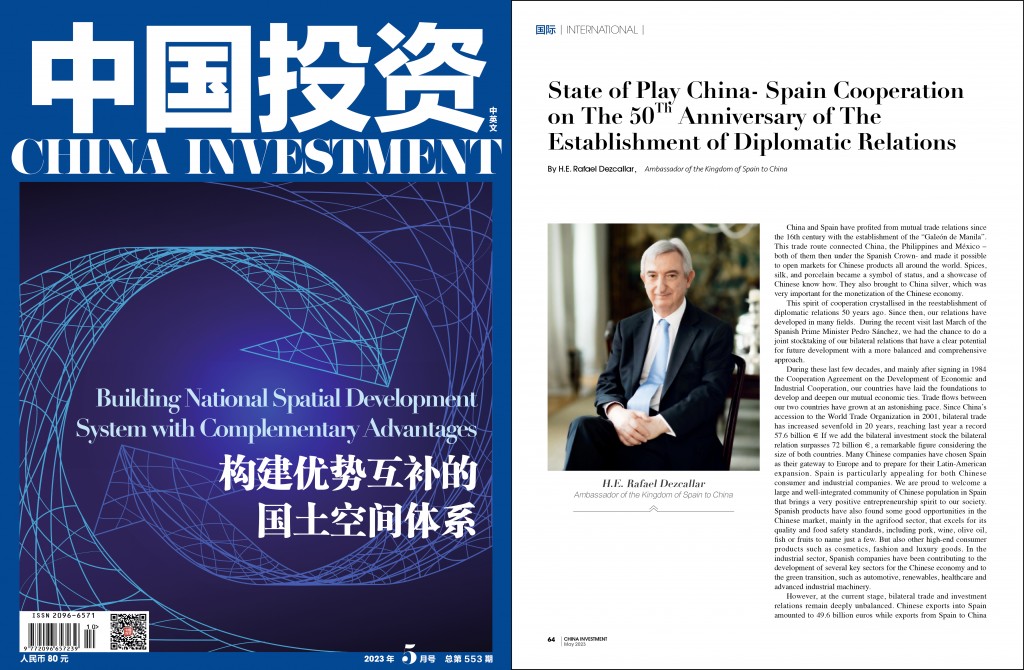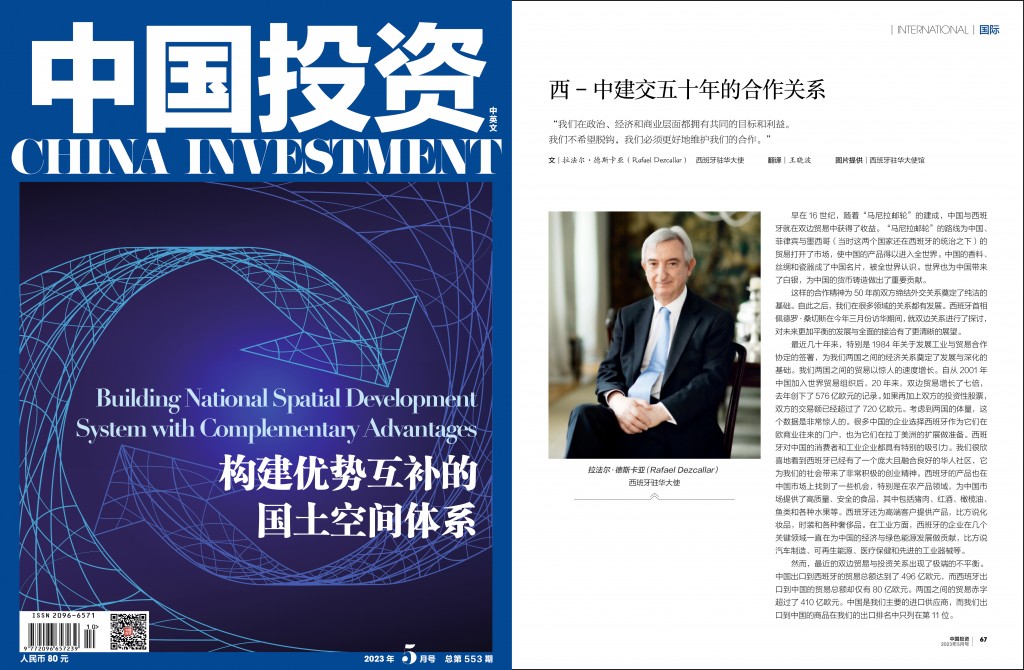State of Play China- Spain Cooperation on The 50Th Anniversary of The Establishment of Diplomatic Relations西-中建交五十年的合作关系
By H.E. Rafael Dezcallar, Ambassador of the Kingdom of Spain to China
文|拉法尔·德斯卡亚(Rafael Dezcallar) 西班牙驻华大使 翻译|王晓波 图片提供|西班牙驻华大使馆
导读
China and Spain have profited from mutual trade relations since the 16th century with the establishment of the “Galeón de Manila”. This trade route connected China, the Philippines and México –both of them then under the Spanish Crown- and made it possible to open markets for Chinese products all around the world. Spices, silk, and porcelain became a symbol of status, and a showcase of Chinese know how. They also brought to China silver, which was very important for the monetization of the Chinese economy.

⬆ Spain-China Advanced Manufacturing Technology Conference, April 12, 2023, at the Spanish Embassy in China
This spirit of cooperation crystallised in the reestablishment of diplomatic relations 50 years ago. Since then, our relations have developed in many fields. During the recent visit last March of the Spanish Prime Minister Pedro Sánchez, we had the chance to do a joint stocktaking of our bilateral relations that have a clear potential for future development with a more balanced and comprehensive approach.

⬆ The largest renewable energy integrated power generation complex in the Canary Islands of Spain, consisting of eight wind farms and 12 photovoltaic power stations.
During these last few decades, and mainly after signing in 1984 the Cooperation Agreement on the Development of Economic and Industrial Cooperation, our countries have laid the foundations to develop and deepen our mutual economic ties. Trade flows between our two countries have grown at an astonishing pace. Since China’s accession to the World Trade Organization in 2001, bilateral trade has increased sevenfold in 20 years, reaching last year a record 57.6 billion € If we add the bilateral investment stock the bilateral relation surpasses 72 billion €, a remarkable figure considering the size of both countries. Many Chinese companies have chosen Spain as their gateway to Europe and to prepare for their Latin-American expansion. Spain is particularly appealing for both Chinese consumer and industrial companies. We are proud to welcome a large and well-integrated community of Chinese population in Spain that brings a very positive entrepreneurship spirit to our society. Spanish products have also found some good opportunities in the Chinese market, mainly in the agrifood sector, that excels for its quality and food safety standards, including pork, wine, olive oil, fish or fruits to name just a few. But also other high-end consumer products such as cosmetics, fashion and luxury goods. In the industrial sector, Spanish companies have been contributing to the development of several key sectors for the Chinese economy and to the green transition, such as automotive, renewables, healthcare and advanced industrial machinery.
However, at the current stage, bilateral trade and investment relations remain deeply unbalanced. Chinese exports into Spain amounted to 49.6 billion euros while exports from Spain to China just reached 8 billion euros. We have a widening trade deficit of more than 41 billion €. China is our main import supplier, but only the 11th destination of our exports.
This situation is neither desirable, nor sustainable. We should find solutions between both countries in a cooperative way. While we obviously recognize the growing competitiveness of Chinese companies and products, the main origin for such an uneven relation is an unbalanced market access and the lack of a level playing field for Chinese and foreign companies. Public statements about openness and national treatment have to be translated into concrete regulations implemented pragmatically in the daily life of Spanish companies operating in China. That includes areas such as public procurement where still remains an explicit discrimination against foreign companies vis-à-vis Chinese ones.
Spain and the EU want to pursue an open strategic autonomy in order to create a more resilient economy in Europe. We must reconcile openness and cooperation with security of supply, development of strategic sectors, competitiveness, and the ecological transition.
We have to work together to engage, rebuild trust and create a community of interests between our two countries and between our companies in areas where we may have more potential for cooperation. Among them, I would like to highlight the synergies between China and Spain in three sectors that are relevant to tackle a global problem: climate change.
The first one is the automotive industry, that is already playing a key role in the decarbonization process. The car industry is very relevant for the Spanish economy, amounting to 10% of our GDP and around 18% of our exports. Spain is the 2nd largest car producer in Europe and the 8th in the world, with 17 production sites across our territory. We produce 38 car models, among them 16 EV models. This success story has been based on foreign direct investment attracted during the last few decades by a highly innovative and competitive ecosystem of auto-part companies, suppliers, human capital and advanced logistic and technological infrastructures. The Spanish automotive value chain has managed to adapt to the needs of very different clients, remaining very competitive and expanding its activity worldwide. Also in China, where Spanish world leaders such as Gestamp or Antolin operate and supply both international and Chinese manufacturers. Just to give an example, one out of four cars produced in China include interior parts supplied by Antolin, a company that has 34 production sites and R&D centers in the country. This has created a symbiotic relation that can play a very positive role to support the value chain of Chinese EV companies developing manufacturing facilities in Europe and Spain.
Definitely, Chinese companies are well positioned with innovative EV brands, and they are taking the lead in critical components such as batteries. Envision has announced a comprehensive agreement with the Spanish government to install a battery production plant in Spain and is partnering up with Spanish companies to develop this project. Companies like BYD have announced an agreement with the Spanish Castrosua to assemble electric buses, while Sentury Tires also committed to invest in a greenfield project to produce tires in the north of Spain. There is a growing momentum and we shall take advantage of the strength and long lasting positive relations between our companies and governments to create new opportunities and shared interests in the automotive industry.
The Spanish government has developed a number of Strategic Projects for the Recovery and Economic Transformation (PERTE). It is an innovative mechanism of public-private collaboration, where public investment is a catalyst for private funding. It is a concept in which public funding mobilizes also private investments, an example of public-private partnership. It is expected that 13 leading projects will mobilize more than 11.855 million € of public and private funds that can potentially benefit Chinese automakers partnering with the local value chain. One of them will be dedicated to the electric and connected vehicle.
Another sector where there is a very clear common interest is the renewables sector. Renewables are a very important part of Spain’s energy transition, as we are shifting to clean energies from nuclear energy and fossil fuels. The renewables have increased their contribution to electricity generation from 32% in 2017 to 47% in 2021. Spain is the fifth country in the world in wind energy and the eighth in renewable generation. Of all green hydrogen projects worldwide, 20% are located in Spain, which is second only to the United States. Spain wants to push forward the renewable energy sector as a key component of the ecological transition, leveraging on the state-of-the-art technologies of Spanish companies in cooperation with other companies, including Chinese patrners. To achieve this goal, the Spanish government has approved another Strategic project for Economic Recovery and Transformation (PERTE) devoted to Renewable Energies, Renewable Hydrogen and Storage. The first PERTE aid programs on Green Hydrogen projects amount to 250€ million and is expected to mobilise 890€ million in 29 projects. Many companies have shown great interest to invest in this sector, which will help Spain to continue to be at the forefront of innovations in this field.
In China, Spanish companies are also contributing throughout the whole value chain of the wind power sector to develop renewable energy generation, bringing their technology and know how to China, including in the increasingly important offshore projects. From the advanced industrial technology sector (machine tools) to produce sophisticated parts of the wind turbines, to technology to asses the best locations for wind farms or new tower structures among others. Some Chinese companies such as Goldwind or Envision are also developing production facilities in Spain to provide their technology and know how to face energy transition challenges.
A third relevant sector is the advanced industrial machinery, that has a significant role throughout a wide range of strategic sectors, providing state-of-the-art technology to automatize industrial processes and to support the manufacturing of components for airplanes, wind turbines, autoparts or ICT, among others. Very recently we organized at the Embassy a meeting between a group of more than 20 Spanish companies and a wide range of Chinses companies where we could witness the good moment and the new opportunities arising in this field. Spain is nowadays the 3rd largest manufacturer and exporter of machine-tools in Europe and the 9th in the World, and has been cooperating since the 80s with Chinese partners.
Current times are challenging. We should work together to promote cooperation rather than confrontation, under a rules-based multilateral system We have common goals and interests both at the political, economic and business levels. We don’t want to delink, but we must manage our links better. For that, we should work together to rebuild trust and create a real level playing field for our companies, and real and tangible openness to tackle our unbalanced relations. We have many opportunities and the support of both governments, as seen during the last visit of Prime Minister Sánchez to China.
早在16世纪,随着“马尼拉邮轮”的建成,中国与西班牙就在双边贸易中获得了收益。“马尼拉邮轮”的路线为中国、菲律宾与墨西哥(当时这两个国家还在西班牙的统治之下)的贸易打开了市场,使中国的产品得以进入全世界。中国的香料、丝绸和瓷器成了中国名片,被全世界认识。世界也为中国带来了白银,为中国的货币铸造做出了重要贡献。
这样的合作精神为50年前双方缔结外交关系奠定了纯洁的基础。自此之后,我们在很多领域的关系都有发展。西班牙首相佩德罗·桑切斯在今年三月份访华期间,就双边关系进行了探讨,对未来更加平衡的发展与全面的接洽有了更清晰的展望。
最近几十年来,特别是1984年关于发展工业与贸易合作协定的签署,为我们两国之间的经济关系奠定了发展与深化的基础。我们两国之间的贸易以惊人的速度增长。自从2001年中国加入世界贸易组织后,20年来,双边贸易增长了七倍,去年创下了576亿欧元的记录。如果再加上双方的投资性股票,双方的交易额已经超过了720亿欧元。考虑到两国的体量,这个数据是非常惊人的。很多中国的企业选择西班牙作为它们在欧商业往来的门户,也为它们在拉丁美洲的扩展做准备。西班牙对中国的消费者和工业企业都具有特别的吸引力。我们很欣喜地看到西班牙已经有了一个庞大且融合良好的华人社区,它为我们的社会带来了非常积极的创业精神。西班牙的产品也在中国市场上找到了一些机会,特别是在农产品领域,为中国市场提供了高质量、安全的食品,其中包括猪肉、红酒、橄榄油、鱼类和各种水果等。西班牙还为高端客户提供产品,比方说化妆品,时装和各种奢侈品。在工业方面,西班牙的企业在几个关键领域一直在为中国的经济与绿色能源发展做贡献,比方说汽车制造、可再生能源、医疗保健和先进的工业器械等。
然而,最近的双边贸易与投资关系出现了极端的不平衡。中国出口到西班牙的贸易总额达到了496亿欧元,而西班牙出口到中国的贸易总额却仅有80亿欧元。两国之间的贸易赤字超过了410亿欧元。中国是我们主要的进口供应商,而我们出口到中国的商品在我们的出口排名中只列在第11位。
这样的状态是不希望看到的,也不可持续。我们双方需要共同努力,找出解决问题的方法。虽然我们清楚地知道中国的企业与中国的产品具有不断增长的竞争力,但是造成如此不平衡关系的主要原因是因为中国企业与外国企业不平等的市场准入,以及缺乏平等的竞争环境。关于开放和国民待遇的声明必须转化为具体的法规,使西班牙在中国的企业能够切实地使用。在公共采购领域,外国企业与中国企业之间也存在着明显的区别对待。
为了使欧盟的经济更有韧性,西班牙与欧盟希望谋求一个开放的战略自主。我们必须将开放和合作与供应安全、战略部门发展、竞争力以及生态转型相协调。
我们必须为我们两个国家和两个国家的企业利益共同努力,在一些有潜力的合作领域,重新建立信任。在众多领域中,我想重点指出三个领域,在此中国与西班牙可以协同增效,一起阻止一个困扰全球的问题:气候变化。
第一个领域是汽车工业。在节能减排方面,汽车工业已经发挥了其重要作用。汽车工业是西班牙经济的主要产业,占国家GDP的10%,占出口总值的约18%。西班牙是欧盟第二大汽车生产商,世界排名第八,全国有17个汽车生产基地。我们可以生产38种车型,其中16种车型为电动车型。取得这些成功的基础是这几十年来汽车零件生产企业、供应商、人力资本和先进的物流和技术基础设施组成的高度创新和具有竞争力的生态系统吸引到了外国直接投资。西班牙的汽车价值链成功地满足了不同客户的需求,具有极高的竞争优势,商业活动也扩展到了全世界。在中国,西班牙的世界级跨国企业,比方说海斯坦普和安通林集团,为其汽车生产提供了服务和汽车部件。举例来讲,在中国生产的汽车中,每四台汽车就有一台使用了安通林集团的汽车部件,该公司在中国拥有34个生产基地以及研发中心。这种共生关系的建立可以发挥积极作用,支持中国电动汽车公司在欧洲和西班牙开发制造设施的价值链。
毫无疑问,中国电动汽车企业在品牌创新上占据有利地位,而且在一些关键部件上具有绝对优势,比方说中国的电池。远景科技集团宣布与西班牙政府达成了一项全面协议,将在西班牙设立一个电池工厂,与西班牙的企业一同发展该项目。比亚迪集团与西班牙的Castrosua集团宣布共同组装电动公交车。还有,森麒麟轮胎股份有限公司也决定在西班牙北部投资一个生产轮胎的绿色能源项目。我们的政府和我们的企业应该把握住这个增长的势头,充分利用这一优势,建立积极长效的关系,在汽车工业领域创造新机会,分享共同利益。
西班牙政府制定了一系列经济复苏和经济转型的战略项目。 这些项目采用了一种创新的公私合营的方式,也就是通过公共投资带动个人投资。这一概念使是公私之间成为伙伴关系。政府希望通过13个优质项目调动超过118.55亿欧元的公共投资和私人投资,它们可以为当地价值链上合作的中国汽车制造商带来潜在的利益。其中的一个利益板块就是电动汽车以及与其相关的产业。
另外一个很明显的、有着共同利益的领域是可再生能源领域。可再生能源是西班牙能源转型中非常重要的一部分,因为我们正在摆脱核能、石油化工能源,转向清洁能源。可再生能源对电力发展的贡献从2017年的32%提高到了2021年的47%。西班牙在风力发电方面位居世界第五,可再生能源位居世界第八。就全球绿色氢气项目而言,20%的项目落户在西班牙,位居世界第二,仅次于美国。西班牙希望将可再生能源领域作为生态转型的重要部分加以推广,并以西班牙企业的先进技术促进与其他国家的企业合作,其中也包括中国的合作伙伴。为了实现这一目标,西班牙政府批准了另一项经济复苏和经济转型的战略项目,专门针对可再生能源、可再生氢气,及其储存技术。对绿色氢气项目的第一批支持将达到2.5亿欧元,在29个项目中,预计投资额将达到8.9亿欧元。很多企业在这个领域表达了极高的投资意愿,这一举措将使西班牙在此领域始终保持在创新的前沿。
西班牙的企业也为中国风力发电领域价值链上的相关产业做出了贡献,为中国可再生能源发电提供了知识和技术方面的支持,其中包括重要性不断增长的海岸线项目。从先进的工业技术领域(机械设备)到生产复杂的风力涡轮机部件,再到评估风电场或新塔结构最佳位置的技术。中国的企业,比如金风科技或远景科技也在西班牙研发生产设备,并且提供他们的技术,共同面对如何解决能源转换的挑战。
第三个是与之相关的先进的工业设备。它在广泛的、具有战略意义的领域发挥着重要的作用,为工业自动化进程提供了最先进的技术,为制造业的发展提供了支持,比方说在飞机制造、风力涡轮机、自动驾驶技术和信息通信技术等方面。就在前不久,我们在西班牙大使馆组织了一次由20多个西班牙企业和中国各个领域的企业一起参加的会议,我们一起见证了这个美好的时刻,并且期望在这个领域出现的新机会。现今,西班牙拥有制造业工厂,是欧洲第3大工业车床出口商,世界第9大车床出口商。从上世纪80年代以来,我们就一直和中国的伙伴比肩合作。
当今的时代充满挑战性。我们应该在基于原则的多边框架下共同努力,促进合作而不是对抗。我们在政治、经济和商业层面都拥有共同的目标和利益。我们不希望脱钩,我们必须更好地维护我们的合作。为了这个目标,我们需要共同努力,重建信任,为我们的企业创造真正公平的营商环境,以真实、坦诚、开放的方式解决我们的不平衡关系。在桑切斯首相访华期间,我们已经看到了很多机会,这些机会对我们两国政府都是非常有利的。




